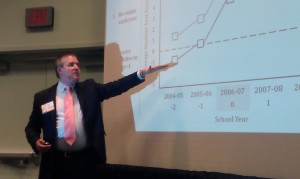
Eric Taylor, researcher at Stanford University, discusses the effect of teacher evaluations on improved teaching.
Presenter: Eric Taylor, Researcher, Stanford University
Summary: Eric Taylor and his colleague John Tyler of Brown University analyzed data from nearly 10 years of experience with the Teacher Evaluation System (TES) in use in the Cincinnati Schools to determine if the evaluation system actually improved teaching. While much of the evaluation discussion centers on process, products (scores) and uses of the data, Taylor and Tyler’s research focuses on actual effect.
They approached their study with a simple research question: Does observed-practice evaluation improve the effectiveness of evaluated teachers as measured by student growth (test scores)?
Their findings indicate that on average, a mid-career teacher’s students score 4.5 percentile points higher after having been evaluated when compared to students that teacher taught before the evaluation.
One important key to this improvement is the rubric used in the evaluation. A good rubric, with specific performance statements that clearly describe observed behavior serves as an explicit roadmap for improvement. The same rubric will provide valuable details on which elements of the evaluation have the greatest effect overall. Over time, a well-designed system informs not only the performance of individual teachers, but also the delivery of instruction throughout the school.
Taylor said that the study was controlled for years of experience, changes in curriculum, and other incidental and environmental factors.
For More Information: Visit Eric Taylor’s webpage at http://cepa.stanford.edu/people/eric-taylor.
ODE’s Educator Evaluation web page can be found at: http://education.ohio.gov/GD/Templates/Pages/ODE/ODEDedicatedPage.aspx?page=970
